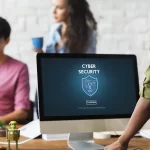Bruce’s Business Tips

Are you handing a criminal the keys to your network? Over the last couple years, network security has become more and more important. We have made tremendous strides when it comes to eliminating SPAM and reducing viruses. We have tools that constantly scan your computer for viruses and we even manually scan your computers on Thursdays (if you are a Fixed IT customer). So you are safe, right? Wrong.
Lately we have seen a number of traps set for unsuspecting users. These traps trick the user into inadvertently handing over the keys to your network. What’s worse is that most of the time the user doesn’t even know it happened. It’s like having your wallet stolen on a busy subway and not even knowing you were on the subway to begin with.
Why does all this matter? If you process credit cards, as most of you do. If you have employee confidential information, as all of you do. Or if you have health care protected information, as some of you do. You are liable. First you are responsible to let the owner of the information know that there has been a breach. Second, you are responsible for whatever the criminal does with that information. Finally, there are a number of fines that stack up quickly for this sort of data breach.
How can you keep this from happening? If you are a Fixed IT customer, we have you covered on the computer and network side. (If you are not a Fixed IT customer, you may want to pick up the phone and find out what your computer support people are doing to protect you.) Computer coverage isn’t enough though. Your users have to know what to look for to keep from accidentally undermining all the security and effort we are doing to protect your data.
Here are three simple tricks users can do to protect their confidential information:
- Never EVER follow a link or call a toll-free number that was sent to you in an email that you were not expecting. Examples include: Links from your airline explaining that you may have purchased a ticket by mistake, an email about a friend that passed away and you have to download a tool in order to view their obituary, or a message from the FBI saying that you have been hacked.
- Read the content of a window before clicking “OK”. This is especially important when opening Word, Excel, Power Point, and Adobe Acrobat Reader (PDF) files. Equally as risky is clicking “OK” in the wrong window when surfing the web. If you don’t understand what it is asking you, give us a call. We would be happy to help.
- If it’s just too late and you realized you have been tricked, stop what you are doing and call us immediately. It is super important that you do not power off your computer or close your web browser. If you are worried about your network getting infected, unplug your network cable or turn off your wireless networking.
For more information on how you can train your users to protect your network, let us know. We have free online certifications for our Fixed IT customers. If you would like to learn more about how to avoid scams, check out our videos on phishing.
-Bruce


